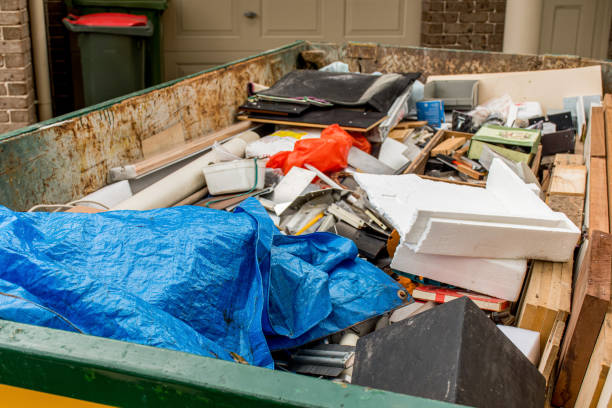Hoarding is a complex issue that can significantly impact the lives of individuals and their families. It goes beyond mere clutter and can lead to hazardous living conditions, creating a pressing need for effective cleanup and organization. One of the most critical aspects of hoarding cleanup is proper trash disposal. Understanding the significance of this process can transform the cleanup from a chaotic undertaking into a well-managed and successful endeavor. This article will explore the importance of proper trash disposal in hoarding cleanup through several unique facets.
Understanding the Impact of Hoarding

Hoarding disorder is a mental health condition that leads individuals to accumulate excessive items, often to the detriment of their living space and overall quality of life. Items can vary widely, from sentimental possessions to ordinary trash, and the inability to part with these items can create an overwhelming environment. Consequently, physical spaces become cluttered, making daily functioning difficult and posing potential health risks.
The clutter associated with hoarding can lead to unsanitary conditions, fostering a breeding ground for pests and bacteria. It may also pose fire hazards, obstruct pathways, and prevent adequate ventilation, impacting the overall safety of the living environment. Addressing the issue requires more than just tidying up—it involves a structured process to remove hazards and restore order. This is where professional hoarding cleanup services play a crucial role, ensuring a safe and functional living space through proper disposal and sanitation methods.
The Role of Trash Disposal in the Cleanup Process
Trash disposal plays a pivotal role in the hoarding cleanup process. Removing accumulated waste is vital in reclaiming space and restoring order, as it clears the pathways and allows for an effective organization of remaining possessions. However, improper disposal can lead to more complications, including environmental hazards and legal implications.
One of the main challenges in hoarding cleanup is distinguishing between items that should be kept, recycled, and disposed of as trash. Processed correctly, this evaluation promotes a healthier living environment. Therefore, trash disposal is not just about throwing items away; it involves thoughtful consideration over what constitutes waste and ensuring that the disposal methods align with local regulations and environmentally-friendly practices.
Mental Wellness and Emotional Considerations
Proper trash disposal in hoarding cleanup also intertwines with the psychological aspects of hoarding disorder. Many individuals who struggle with hoarding have profound emotional attachments to their belongings, making the act of disposal extremely challenging. Understanding this emotional landscape is crucial for anyone involved in the cleanup process.
Creating a supportive and non-judgmental environment can facilitate better decision-making during the disposal process. Involving mental health professionals and trained organizers can help guide individuals through the emotional maze, encouraging them to evaluate their possessions based on sentiment and utility. By focusing on humane and respectful methods of disposal, the cleanup process can become a healing endeavor, rather than just a physical one.
Environmental Responsibility in Disposal Practices
In recent years, there has been an increasing awareness of environmental concerns related to waste disposal. In the context of hoarding cleanup, employing eco-friendly disposal methods is essential not only to mitigate environmental impact but also to set an example of responsible living for those who hoard.
Utilizing recycling centers, donating usable items to local charities, and composting organic waste are excellent strategies that promote sustainability. These practices not only reduce the volume of waste sent to landfills but also help individuals reconnect with their community by ensuring that usable items can benefit others. When addressing the issue of trash disposal, it is crucial to encourage environmentally responsible methods that reflect a genuine concern for the planet.
Legal Compliance and Community Standards
Proper trash disposal is also a matter of legal compliance and adherence to community standards. Each municipality has its regulations regarding waste disposal, including what can be discarded, how it should be disposed of, and the penalties for improper disposal. Ignoring these regulations can lead to fines, increase liability for property owners, and create additional stress for individuals involved in hoarding.
Working with professional cleaners who understand local laws and regulations can be invaluable. They can provide insights into how to dispose of waste appropriately while navigating community guidelines. By ensuring that trash disposal is compliant, families can avoid potential legal issues and foster a more responsible approach to managing their environment.
Creating a Framework for Ongoing Organization
Once the trash is properly disposed of, the focus can shift towards organization and prevention of future hoarding tendencies. The cleanup process presents an opportunity to implement effective organization strategies that help maintain a functional living space.
Establishing a framework for ongoing organization can be vital in helping individuals manage their belongings going forward. This might include creating designated spaces for specific items, employing storage solutions, and implementing regular decluttering schedules. By emphasizing proper trash disposal as part of a comprehensive plan, the effort can lead to sustainable changes that promote healthier living over time.
Conclusion
Proper trash disposal is an integral part of hoarding cleanup, with far-reaching implications that extend beyond the immediate action of throwing things away. The complexities surrounding hoarding require a thoughtful approach to ensure the physical, emotional, and environmental aspects are honored. By understanding its significance, we can transform the cleanup process into a powerful opportunity for healing, renewal, and transformation.
Addressing hoarding isn’t solely about reclaiming space but also nurturing a supportive environment that fosters mental wellness, responsible practices, and long-term sustainability. Therefore, engaging professionals and implementing strategies around proper trash disposal can lead to more successful outcomes and ultimately create a healthier living space. In a world where clutter can be overwhelming, the opportunity for recovery and growth remains a testament to resilience, support, and proactive action.